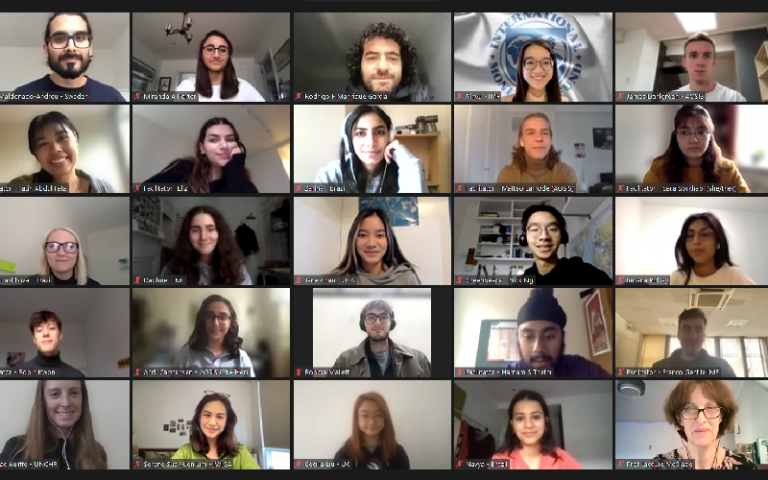UCL Youth COP: A Student Perspective
27 October 2021
As youth involvement in tackling global warming is becoming more than necessary, UCL’s first Youth COP was the perfect opportunity for students to take an active role towards finding global solutions to the climate crisis.

Speeches by UCL’s experts in climate action
- Richard Jackson, Director of sustainability
Richard Jackson emphasised that “an institution like UCL can drive climate action forwards” significantly, especially considering the size and plethora of expertise that the multidisciplinary university has. Jackson also stated that events like the UCL Youth COP provide an opportunity for students to practice the vital skill of reaching a “common ground” despite the differences in priorities of individual actors partaking in negotiations.
- Professor Jacqueline McGlade, Institute for Global Prosperity
Professor McGlade provided various tips to students for successful negotiations regarding the climate crisis. This included the necessity of developing “resilience”, “standing your ground” and “being authentic”. She also stressed the importance of “stepping into the world” of politicians to help them “connect the dots” and show interconnectivity in the way that climate change affects all facets of life, whether it is land, food, transportation or water.
- Zi Han Xuan, Executive Director of Climate Action Society
Zi Han Xuan emphasised that “negotiations surrounding climate change need to be more meaningful and inclusive”, as “not everyone who deserves to be present in negotiations has their voice heard”. This UCL Youth COP provides this voice whilst “mobilising an increasing collective movement which in turn adds pressure to negotiators to be more ambitious.”
The negotiations
Student participants then moved into one of 12 interest groups on behalf of which they were acted throughout the negotiation simulations on the day. The groups ranged from Royal Dutch Shell and Greenpeace to the People’s Republic of China and the Alliance of Small Island States (AOSIS).
All the different actors made opening statements which outlined their goals for the conference. Notably, Brazil, who came under fire over recent years as a result of Brazilian President Jair Bolsonaro’s controversial decisions regarding climate change, attempted to “regain trust” and create a “better reputation”, as they stated their commitment to stop deforestation by 2030 and reserve 14% of their land for indigenous people.
Headlines throughout the day revealed the heated, bilateral discussions taking place in some of the negotiation breakout rooms. Some include:
“Exclusive: the US attempts to “regain trust” after “4 turbulent years” as they are back in the global warming world effort
Breakthrough: China is willing to phase out coal earlier than 2050 if they receive subsidies from other countries
“Hardliner: Alliance of Small Island States refuse to concede as Shell requests more time and money to complete climate action goals
‘Yes': The UK and the USA agree that China needs to reduce emissions significantly by 2050
Resolutions passed after hours of negotiations:
- Resolution 1a)
Annex I countries must raise the minimum $100 billion per year and should establish mechanisms to scale up funding to reach a total of $300 billion per year by 2050, among other things by tapping into the worldwide pool of private finance, to help LDCs in their fight against climate change.
- Resolution 2b)
Annex I countries should commit to net zero emissions by 2050, non-Annex I countries should commit to net zero emissions by 2060.
- Resolution 3a)
We should give protected status to 30% of natural areas to avoid future destruction. Especially unique areas that are of high importance to the global ecosystem and carbon system should be protected, such as mangroves, the arctic, the rainforests and sea kelp forests.
- Resolution 4b)
Coal must be phased out by 2030 for Annex I, by 2040 for other major emitters and by 2050 for the rest of the world.
- Resolution 5c)
All countries should adopt India’s ambition: transition towards electric vehicles in a gradual manner with an interim target of 30% electrification of all new vehicles sold by 2030. Further transition to ZEVs should be market let.
- Resolution 6c)
All countries should determine their one path towards sustainable farming practices.
- Resolution 7b)
All countries must allow people fleeing from natural disasters, environmental degradation and sea-level rise to enter their countries and make new homes there
Presenting the Youth COP Outcomes to UCL's COP26 representatives
UCL’s very own COP26 Representatives Professor Jacqueline McGlade, Professor Rodney Harrison, Dr Jerome Lewis and Robbie Mallett joined the UCL Youth COP at the end of the day, sharing their reactions to the resolutions passed. They also emphasised the importance for UCL’s COP26 representatives to represent student voices.
Notably, Dr Jerome Lewis, UCL Anthropology echoed the most important facet of youth conferences like these, that often focus on “policy without the politics”, which means that “clear thinking is what emerges when there aren't competing interests influencing the decision process”, resulting in more “ambitious” resolutions. Ultimately, he said it can be seen as “wiser to ask the youth for their solutions rather than politicians with fingers in many pies”.
By Martin Barabas, Politics and Sociology, First Year
 Close
Close


